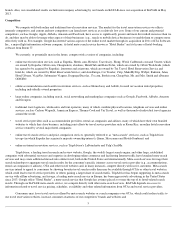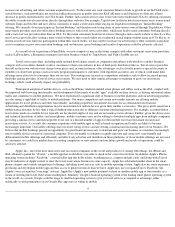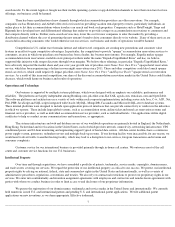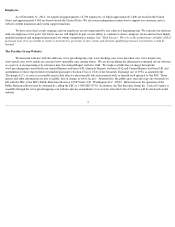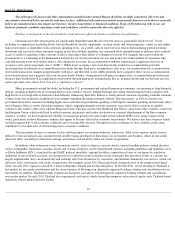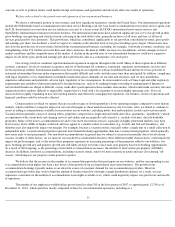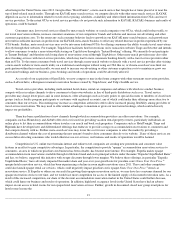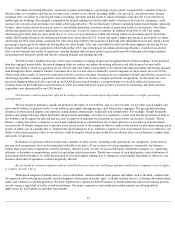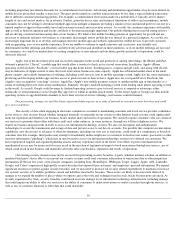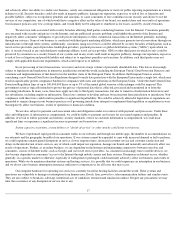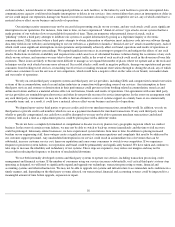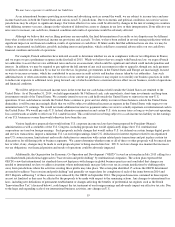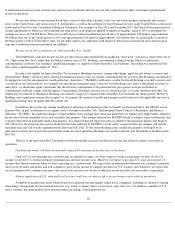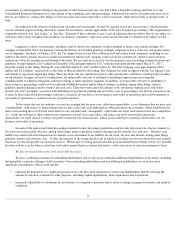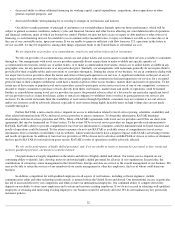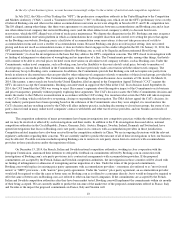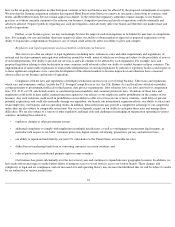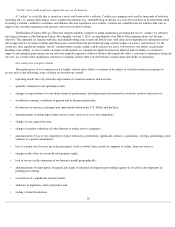Priceline 2014 Annual Report Download - page 19
Download and view the complete annual report
Please find page 19 of the 2014 Priceline annual report below. You can navigate through the pages in the report by either clicking on the pages listed below, or by using the keyword search tool below to find specific information within the annual report.
Our online advertising efficiency, expressed as online advertising as a percentage of gross profit, is impacted by a number of factors
that are subject to variability and that are, in some cases, outside of our control, including ADRs, costs per click, cancellation rates, foreign
exchange rates, our ability to convert paid traffic to booking customers and the extent to which consumers come directly to our websites or
mobile apps for bookings. For example, competition for desired rankings in search results and/or a decline in ad clicks by consumers, could
increase our costs-per-click and reduce our online advertising efficiency. We use third party websites, including online search engines (primarily
Google), meta-search and travel research services, and affiliate marketing as primary means of generating traffic to our websites. Our online
advertising expense has increased significantly in recent years, a trend we expect to continue. In addition, from 2011 to 2013 our online
advertising grew faster than our gross profit due to (1) year-over-year declines in online advertising returns on investment and (2) brand mix
within The Priceline Group as our international brands grew faster than our U.S. brands and spent a higher percentage of gross profit on online
advertising. In 2014, these trends continued, but were more than offset by the inclusion of KAYAK and OpenTable because they spend a lower
percentage of gross profit on online advertising than our other brands. Also, our consolidated results exclude intercompany advertising by our
brands on KAYAK since our acquisition of KAYAK in May 2013. Any reduction in our online advertising efficiency could have an adverse
effect on our business and results of operations, whether through reduced gross profit or gross profit growth or through advertising expenses
increasing faster than gross profit and thereby reducing margins and earnings growth.
We believe that a number of factors could cause consumers to engage in increased shopping behavior before making a travel purchase
than they engaged in previously. Increased shopping behavior reduces our online advertising efficiency and effectiveness because traffic
becomes less likely to result in a purchase on our website, and such traffic is more likely to be obtained through paid online advertising channels
than through free direct channels. Further, consumers may favor travel services offered by search companies or meta-search sites over OTAs,
which could reduce traffic to our travel reservation websites, increase consumer awareness of our competitors' brands and websites, increase our
advertising and other customer acquisition costs and adversely affect our business, margins and results of operations. To the extent any such
increased shopping behavior leads to growth in our KAYAK meta-search business, such growth may not result in sufficient increases in
revenues from our KAYAK meta-search business to offset any related decrease in gross profit or increase in advertising and other customer
acquisition costs experienced by our OTA brands.
Our business could be negatively affected by changes in Internet search engine algorithms and dynamics or traffic-generating
arrangements.
We use Google to generate a significant portion of the traffic to our websites, and, to a lesser extent, we use other search engines and
meta-search websites to generate traffic to our websites, principally through pay-per-click advertising campaigns. The pricing and operating
dynamics on these search engines can experience rapid change commercially, technically and competitively. For example, Google frequently
updates and changes the logic which determines the placement and display of results of a consumer's search, such that the placement of links to
our websites can be negatively affected and our costs to improve or maintain our placement in search results can increase. Google's "Hotel
Finder," a utility that allows consumers to search and compare hotel accommodations, has at times placed at or near the top of hotel-related
search results. If Google changes how it presents travel search results or the manner in which it conducts the auction for placement among search
results, in either case in a manner that is competitively disadvantageous to us, whether to support its own travel related services or otherwise, our
ability to efficiently generate traffic to our websites could be harmed, which in turn would have an adverse effect on our business, market share
and results of operations.
In addition, we purchase website traffic from a number of other sources, including some operated by our competitors, in the form of
pay-per-click arrangements that can be terminated with little or no notice. If one or more of such arrangements is terminated, our business,
market share and results of operations could be adversely affected. Lastly, we rely on various third party distribution channels (i.e., marketing
affiliates) to distribute accommodation, rental car and airline ticket reservations. Should one or more of such third parties cease distribution of
reservations made through us, or suffer deterioration in its search engine ranking, due to changes in search engine algorithms or otherwise, our
business and results of operations could be negatively affected.
Recent trends in consumer adoption and use of mobile devices create new challenges and may enable device companies such as Apple
to compete directly with us.
Widespread adoption of mobile devices, such as the iPhone, Android-enabled smart phones and tablets such as the iPad, coupled with
the improved web browsing functionality and development of thousands of useful "apps" available on these devices, is driving substantial online
traffic and commerce to mobile platforms. We have experienced a significant shift of business to mobile platforms and our advertising partners
are also seeing a rapid shift of traffic to mobile platforms. Our major competitors and certain new market entrants are offering mobile
applications for travel products and other functionality,
15


